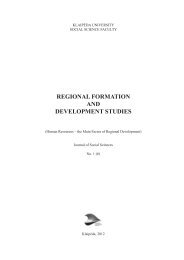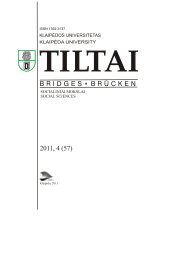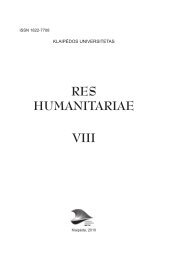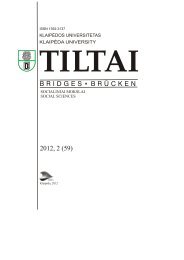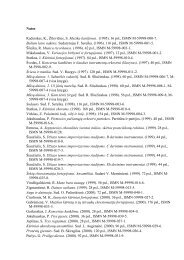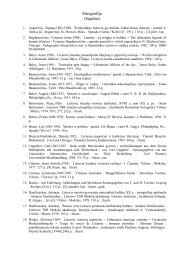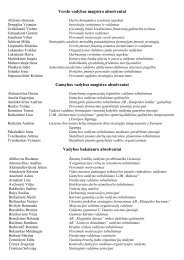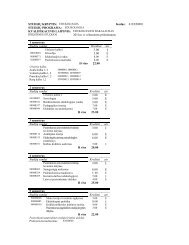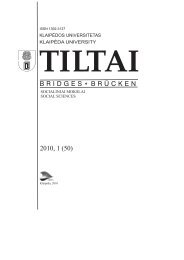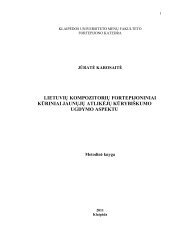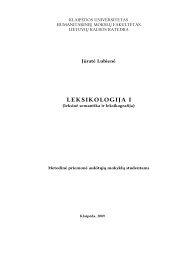2013,1 (62) - KlaipÄdos universitetas
2013,1 (62) - KlaipÄdos universitetas
2013,1 (62) - KlaipÄdos universitetas
Create successful ePaper yourself
Turn your PDF publications into a flip-book with our unique Google optimized e-Paper software.
ISSN 1392-3137. TILTAI, <strong>2013</strong>, 1<br />
PRIVATE SECTOR CROSS BORDER TRADE TO EMERGING<br />
MARKET ECONOMIES: HOW CAN EXPORT CREDIT AGENCIES<br />
HELP TO MANAGE THE RISKS?<br />
Trung Quang Dinh, Hilmar Þór Hilmarsson<br />
University of Akureyri, School of Business and Science (Iceland)<br />
Abstract<br />
Private sector companies engaging in cross border trade and/or investments in emerging market economies<br />
are faced with risks that are different from risks in domestic markets. Emerging markets often offer<br />
opportunities for high returns, but at the same time the risks, including both commercial and noncommercial/political<br />
risks, can be high. Risk mitigation can thus be beneficial. The article discusses the<br />
opportunities and the challenges that private companies may face when engaging in trade and/or investment<br />
in emerging markets. It will then discuss options for using risk mitigation instruments offered by<br />
export credit agencies (ECAs). The article also discusses recent examples of cross border trade and projects<br />
in emerging markets to illustrate how those instruments have been applied in real world situations.<br />
KEY WORDS: Cross border trade and investment, emerging markets, export credit agencies (ECAs),<br />
commercial and non-commercial risks, and risk mitigation instruments.<br />
Anotacija<br />
Privataus verslo organizacijos, kurios prekiauja ir investuoja pasienyje, turi įvertinti rizikos veiksnius ne<br />
tik rinkos, bet ir savo šalies ekonomikoje. Rizikos rinkos dažnai lemia dideles įplaukas, bet kartu tai susiję<br />
su didesne rizika, įtraukiant komercines ir nekomercines / politines rizikas. Straipsnyje analizuojamos<br />
galimybės ir iššūkiai, tenkantys privačioms organizacijoms, kurios siekia prekiauti ar investuoti rizikos<br />
rinkose. Aptarta galimybė naudotis eksporto kredito agentūrų paslaugomis, siekiant sušvelninti rizikos<br />
veiksnius. Straipsnyje aptarta ir reali patirtis, kaip sušvelninti rizikos rinkų veiksnius.<br />
PAGRINDINIAI ŽODŽIAI: pasienio prekyba ir investicijos, rizikos rinkos, eksporto kredito agentūros,<br />
komercinė ir nekomercinė rizika, rizikos švelninimo instrumentai.<br />
Introduction<br />
Private sector companies who engage in trade and investments in emerging markets<br />
are both faced with commercial risks and non-commercial/political risks. Political<br />
risks are typically higher in emerging markets than in developed countries. The World<br />
Bank’s Multilateral Investment Guarantee Agency (MIGA) recently published a report<br />
titled World Investment and Political Risk (MIGA, 2009). This report includes an<br />
extensive literature review on foreign direct investment and political risks. The study<br />
found that while a degree of ambiguity exists when it comes to the relationship<br />
between political risk variables and foreign direct investment (FDI) based on econometric<br />
studies, findings based on surveys unequivocally support the view that companies<br />
do take into account political risk in their investment decisions (MIGA, 2009).<br />
According to the Economist Intelligence Unit in recent years there has been growing<br />
evidence that political risk not only features in investment decisions, but is also moving<br />
towards the top of corporate agendas, as reflected in various business surveys.<br />
This is especially true for emerging markets where generic political risk is identified<br />
as main investment constraint (EIU, 2007). A report from Lloyd’s found that global<br />
businesses were becoming more concerned about risk from political violence. More<br />
13



